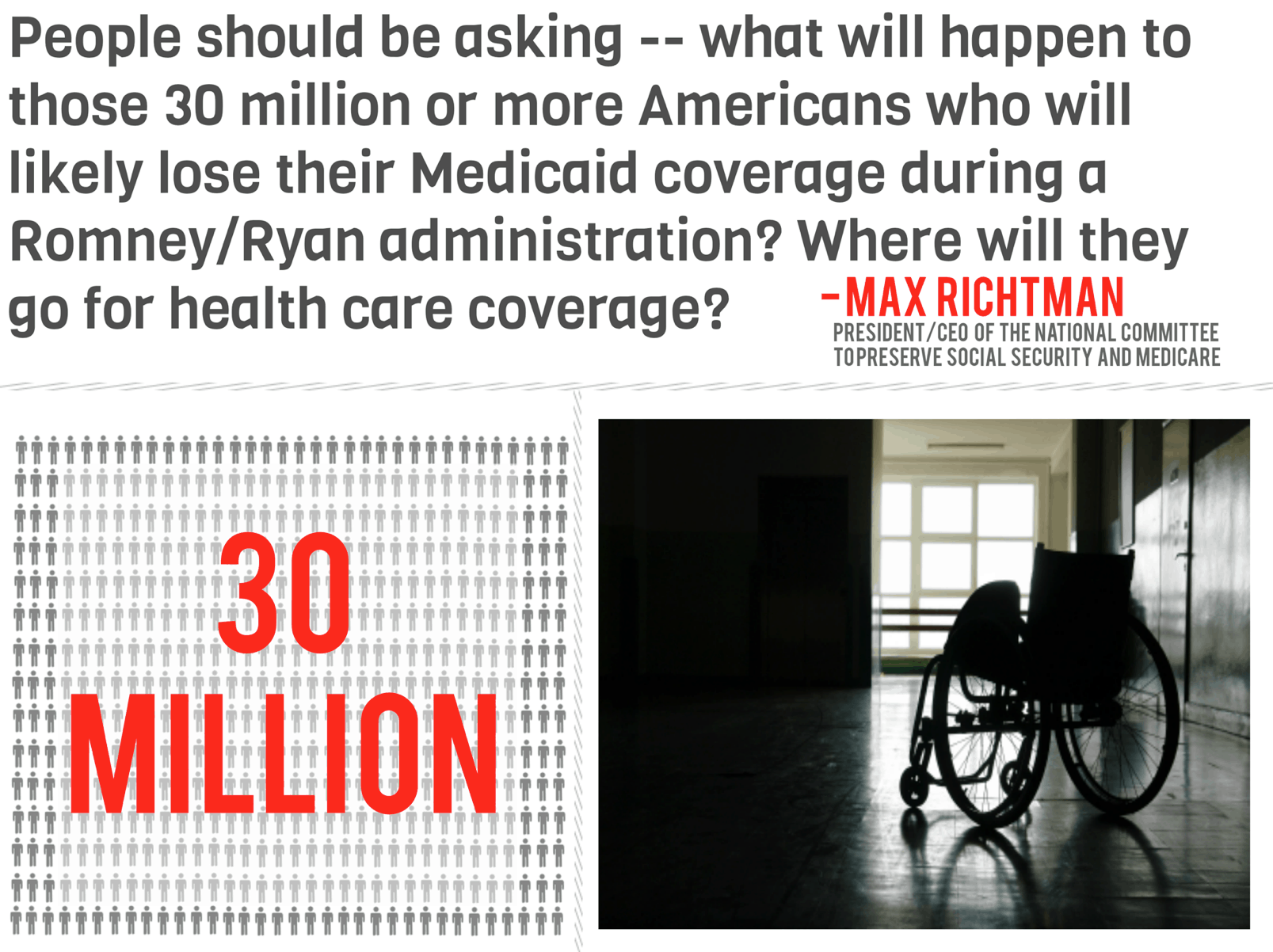
By Max Richtman
President and CEO, National Committee to Preserve Social Security and Medicare
10/22/12
Originally posted on Huffington Post
As we enter the final weeks of the 2012 campaign season, middle-class Americans are finally getting a glimpse of just how devastating Mitt Romney and Paul Ryan’s radical plans for Medicare and Social Security would be for generations of seniors and their families. In spite of repeated attempts to deflect attention from their proposals to cut benefits and privatize these programs, it’s clear that the more voters find out about the Romney/Ryan plan the less they like it. Unfortunately, Medicaid is not yet on the radar screen for most Americans. They don’t realize that the Romney/Ryan plan for the 62 million Americans helped by the Medicaid program is just as destructive.
No political candidate should get a pass on a plan that fundamentally changes the Medicaid program by shifting responsibility to states through block-grants while cutting $810 billion in federal funding during the first decade alone, with even more cuts to follow. When Chairman Ryan included a similar Medicaid block-grant proposal in his budget last year, the Kaiser Family Foundation and Urban Institute estimated it would lead states to drop between 14 million and 27 million people from Medicaid by 2021. An additional 13 million people would also lose Medicaid benefits because of the repeal of health care reform promised by Governor Romney.
Many Americans don’t realize that the largest component of Medicaid is long-term care for America’s elderly followed by the disabled. People should be asking — what will happen to those 30 million or more Americans who will likely lose their Medicaid coverage during a Romney/Ryan administration? Where will they go for health care coverage? As is often the case, there are no answers to these critical questions because so few people even know to ask them.
The Romney/Ryan block-grant strategy is especially problematic for people who need nursing home level of care. The average annual nursing home cost is prohibitively expensive — over $75,000 for a semi-private room. No matter how hard they save for retirement, most middle-class families simply cannot afford the staggering costs of 24-hour skilled care and are forced to seek help from Medicaid. However, according to the Center for Medicare Advocacy, all too many nursing homes residents could lose their Medicaid coverage under the proposed Romney/Ryan plan.
States will also be able to change their Medicaid financial and eligibility rules, making residents and their relatives legally responsible for paying for a greater portion of nursing home expenses. To recover Medicaid costs, states could place a lien on the resident’s property even if the resident’s spouse or children continue to live in the home.
Likewise, the clock could be turned back on spousal impoverishment rules. Currently, nursing home residents’ spouses are allowed to retain some of their assets and income to live in their own homes and communities. However, if the law changes, spouses could be required to contribute even more of their income forcing many who are living on the edge into certain poverty. Americans already contribute $450 billion in uncompensated care with many being forced to quit their jobs and tap into their own retirement funds to help care for a family member. Passing along even more costs to cash-strapped families does not make sense for our nation.
As our nation’s population ages, we should be looking for ways to improve critical health care programs like Medicaid to protect our hardworking families. Medicaid is more efficient than private insurance (96 percent of funding goes directly to coverage) and provides a lifeline to young and old who are among the sickest, and most in need. The future of this program deserves close scrutiny during this election season and it is up to voters to ask the questions and demand straightforward answers.
Follow Max Richtman on Twitter: www.twitter.com/maxrichtman



